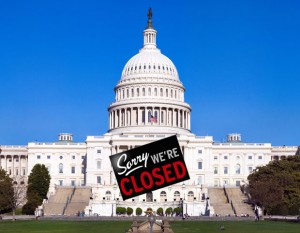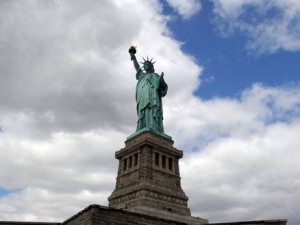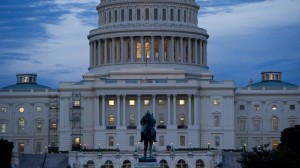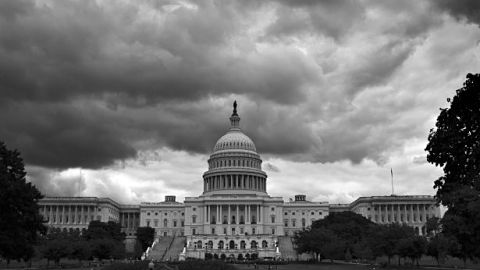Evincing its habit of being a step behind what’s actually going on, the New York Times, having acquired the 126-year-old International Herald Tribune, is now called “The International New York Times.” One step behind now may as well be 126 years. (Note to Times editors: It’s a global world now, no longer an international one.)
 It’s not just the leading media voice of America that refuses to get it. Or the cable news networks that are scapegoating Congress, universally blamed as the cause of the nation’s woes, rather than a symptom of them. Elites around the world refuse to see that the old world order is history.
It’s not just the leading media voice of America that refuses to get it. Or the cable news networks that are scapegoating Congress, universally blamed as the cause of the nation’s woes, rather than a symptom of them. Elites around the world refuse to see that the old world order is history.
With politicians and pundits stuck in the past, we’ve re-entered the realm of medieval metaphysics, where nothing is certain except increasing uncertainty. Economists might as well start reading the entrails of goats again.
Not raising the debt ceiling isn’t the same as defaulting, but that’s a distinction with little difference at this point. The fat lady has sung on the American Empire, and everyone knows it except America. Whether Tea Party fanatics leading this farce intend it or not, the USA is acting like the little boy on the ball-field whose team is losing the game, so he takes his ball and goes home.
And whether the American government defaults on its debts or not, the deed and damage are already done. Far from being a ‘manufactured crisis,’ this is a genuine one, the expression of underlying erosion in the United States, as well as the end the post-World War II international system. Shifts in world history can’t be papered over.
The United States is shredding the last cohesiveness of the international system it formed after World War II. The shredding began with Bush-Cheney’s illegal invasion of Iraq. It was followed on by Barack Obama’s doubling-down on the stupid war in Afghanistan, as well as on extrajudicial drone strikes (after feebly dropping the ‘war on terror’ rhetoric at the beginning of his first term). And now America is undermining the international economic system.
It’s one of the tragic ironies of history that the United States is pulling the rug out from under the international financial system that ‘the indispensible nation’ created after the Second World War.
China, which has no vision for the world (communism is dead in everything except authoritarian state control) is nonetheless right to say: “It is perhaps a good time for the befuddled world to start considering building a de-Americanised world.”
The question now is: Where do we (and I don’t just mean Americans) go from here? In the foolhardy direction that the “international relations expert” Parag Khanna advocates: “Yet more fragmentation and division, even new sovereign states, as a crucial step in a longer process toward building transnational stability among neighbors?”
In a disturbing piece entitled, “The End of the Nation State,” Khanna doesn’t utter a word about the shared crises of  ecology, economy and ethics in the global commons. “In the face of rapid urbanization, every city, state or province wants to call its own shots…. and they can, as nations depend on their largest cities more than the reverse,” he exclaims.
ecology, economy and ethics in the global commons. “In the face of rapid urbanization, every city, state or province wants to call its own shots…. and they can, as nations depend on their largest cities more than the reverse,” he exclaims.
Khanna promotes a fantasy of “complex layering of territorial, legal and commercial authority going hand in hand with the second great political trend of the age—devolution.”
‘Devolution doesn’t just mean “the transfer or delegation of power to a lower level, especially by central government to local or regional administration.” It also means “degeneration, deterioration and decline.”
Even if power is being decentralized from nation-states to local and regional authorities (Khanna inexplicably gives the East African Community as an example), it just begs the question—who and what will attend to the global commons?
A global society is something new in human history, and the international sphere cannot expand to encompass it. The two spheres—international and global—belong to different dimensions of reality and history. And the new circumstances of human civilization have to be met by creative insights and bold actions, just as they always have.
As to why America is self-destructing, the paralysis of the federal government is a symptom, not the cause. We don’t have an economic problem, and the political problem is a manifestation of something much deeper.
The American people have perished from too many lies and too much self-indulgence, and they simply don’t care. The pendulum is broken, and right-wing crazies are gaining momentum.
When a people perish, there is no bottom until denial and scapegoating cease, and a sufficient minority of awakening people builds a new bottom.
 With respect to the human prospect, leadership can’t come from China any more than America, but it can come from a new sector. World citizens have to step into the vacuum. An emergent global advocacy movement, exemplified by a network called Avaaz, which Desmond Tutu is throwing his weight behind, is pointing in the right direction.
With respect to the human prospect, leadership can’t come from China any more than America, but it can come from a new sector. World citizens have to step into the vacuum. An emergent global advocacy movement, exemplified by a network called Avaaz, which Desmond Tutu is throwing his weight behind, is pointing in the right direction.
However the emerging global polity needs to focus its voice through a non-power-holding global body, preferably in Africa, the evolutionary birthplace of humanity. Such a body would holistically and systematically propose new policy insights for governments and international institutions, as well as hold nation-states and international organizations accountable to the human prospect as a whole.
Humankind will then have a workable three-dimensional system that supersedes and supplements the obsolete two-dimensional nation-state and international world order.
Martin LeFevre

